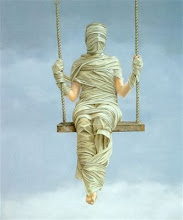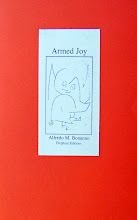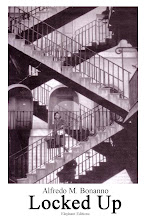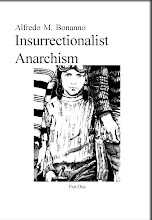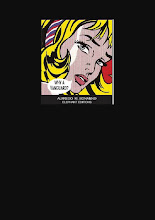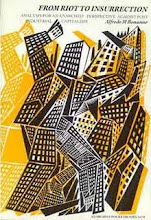from 'Armed Struggle in Italy 1976-78', Elephant Editions
We see the present historical situation as one that is characterised by a state of increasing illegality in which vast strata of society find themselves. Millions of unemployed young people and those on the margins of society are having to use what ever means are available in order to survive: thousands of women are obliged to have back street abortions; workers are practicing individual forms of sabotage, absenteeism and production boycotts; there are those in the system's concentration camps (special prisons, psychiatric hospitals etc.) who are rebelling; proletarian squatters have not paid rent for years; ethnic communities are reaffirming their identities; ‘hooligans’ are crowding metropolitan ghettos; and many others.
The very fact that all these exploited are imposing their presence as living contradictions in the midst of capitalism's process of totalitarian transformation, constitutes an inadmissible form of illegality for the State. The State's response is to eliminate this in any way possible, using a whole arsenal of brutal repressive instruments in the attempt.
We see our task as that of attempting to transform this mass illegalitarianism into a situation of generalised rebellion that the State would no longer be able to absorb into the dialectic claiming better conditions/reform/control. There is only one way to do this: to demonstrate with actions that each one of us has an enemy that is identifiable in precise structures and personages, and that this enemy is not invulnerable. We must demonstrate through action that individual revolt can and must transform itself into collective insurrection, the only one capable of really freeing us from oppression. It now seems clear to us that this means going beyond the limiting logic of defense against State violence. It is instinctive for anyone who is subjected to a system of exploitation that tries to bend them to its will to defend themselves, and in fact everyone is trying to do so in one way or another. There are those who make make themselves the knowing collaborators of power, or who delegate this defense to others ‘more capable’.
We, who consider ourselves conscious revolutionaries, cannot limit ourselves to this. We must and will attack the State. Moreover, we are not attacking it to take possession of it in turn, but to destroy it in all its forms and realisations.
The creative essence of anarchism is present in this work of destruction: in striking and eliminating its hierarchical mechanisms right away, we are at the same time creating the premise for the libertarian management of society. We are not proposing a preconceived model of society, the justice of which we want to convince others, but want to put each person in the condition of managing his or her own actions directly, free the impositions of power and its servants.
We maintain that some instruments of struggle have been acquired not only and not so much by certain sectors of the revolutionury movement, but by the whole proletarian movement, which cannot in any way be reduced to one or more organisation or set of initials. We think that the instruments we have at our disposition should be addressed to this situation of struggle.
..At this point attention should be paid not to exchange the instrument with the aim to be attained. We must not let armed and illegal practice in struggle become an end in itself and valid as such, therefore unchangeable, infallible, self-sufficient and omnipotent. ...The practice of violent attack against the State that we are interested in developing is identifiable not only and not so much with the shooting in the legs of notorious Christian Democrats, but must permeate every aspect of our struggle, every field of intervention. For our attack to be effective we must be able to identify the structures and representative of power in every city, factory, school, quarter, barracks, institution, right to the relationships that exist among ourselves, and strike them with all the range of instruments and arms that our fantasy suggests.
This should prevent us from falling into Leninist-type mystification where, directing the attack towards a mythical ‘heart of the State’, they are actually preparing for the conquest of this heart in order to take it over, leaving all the old capillaries intact and spread throughout the whole country. Our task is also to deny the absurd equation (so convenient to the State) ‘armed struggle equals clandestinity’, which would lead us in to accepting the role of ‘professionals’ of armed struggle and the reduction of our activity and our very lives to the purely military aspect of struggle.
As anarchists our efforts should, on the contrary, be that of demonstrating that it is possible to go beyond these divisions into roles, against the formation of an elite of experts, and the false alternative (not by chance one that is desired and encouraged by the State), between creative people and pistoleros.
skip to main |
skip to sidebar

Some writings of Alfredo Maria Bonanno in English, or almost

Alfredo Bonanno was arrested on October 1st 2009 in Greece, accused of concourse in robbery. With him, anarchist comrade Christos Stratigopoulos.
Here are a few translations and part translations of a small portion of Alfredo's writing. This is a work in progress, many of the translations are as yet incomplete. Open links to find more of Alfredo's work.
Alfredo Bonnano Released
Nov. 22 Alfredo Bonnano was sentenced to 4 years imprisonment (which practically means that with the time served so far and the fact that he is over 70years old HE IS RELEASED
Christos Stratigopoulos (who took responsibility for the action)
was sentenced to 8 years and 9 months with the Greek law will probably be released at the end 2011
BY ANY MEANS NECESSARY
LINKS
click on any of these labels to read text
- "Community" sickness
- 1981 - Editorial
- A Critique of Syndicalist Methods
- A few notes on Sacco and Vanzetti
- A few notes on the revolutionary movement in Italy
- A little man in Singapore
- A million jobs
- A question of class
- Affinity
- After Marx autonomy
- Albania Laboratory of Subversion (Introduction)
- Anarchism and the national liberation struggle
- Anarchists and action
- AND WE WILL ALWAYS BE READY TO STORM THE HEAVENS AGAIN (Against amnesty)
- ANTI-INSTITUTIONAL MOVEMENT
- Are we modern?
- Armed Joy
- ARMED STRUGGLE. SOME REFLECTIONS.
- Autonomous base nuclei
- beyond syndicalism
- Beyond workerism
- But what is the imaginary?
- Class War
- Comiso - Organizational document of the self-managed leagues
- Considerations on illegality
- Dissonances (Introduction)
- Elephant Editions 1986
- Excluded and included
- Farewell to claiming
- Feral Revolution (Introduction)
- FICTITIOUS MOVEMENT AND REAL MOVEMENT
- For an Antiauthoritarian Insurrectionist International - Proposal for a debate
- From riot to insurrection
- From the centre to the periphery
- Good technology
- Guerilla Extraordinary
- Habits and idols
- Hegel
- I know who killed chief superintendent Luigi Calabresi
- Illegality
- Illness and capital
- Informal organisation
- Insurrection
- Internationalism
- Introduction to Sabate
- Introduction to Anarchism and Violence
- Introduction to Bratach Dubh English edition of Malatesta's Fra Contadini
- Introduction to Insurrectionalist Anarchism
- Introduction to Strange Victories
- Introduction to The Conquest of Bread
- Involuntary aspects of voluntary work
- Let's destroy work
- LET'S DESTROY WORK. New introduction
- Let's keep our feet on the ground please
- Lightening Conductors and Stand-ins - more shots of non-news
- Lightning Conductors and Stand-ins
- Lightning Conductors and Stand-ins (cont.)
- Locked up
- Looking forward to self-management
- Loss of language
- More on internationalism
- National Liberation Struggle
- nineteen years on
- No more crises
- Non-news about drugs
- Non-news about racism
- Ode to the Uniform
- On Feminism
- One's life on the line
- Order and chaos
- Otto Ruhle (Introductory Note)
- OUR ROLE IN THE PRESENT CONFLICT
- Palestine mon amour
- Pantagruel anarchist review
- Pinelli
- Prison and Prisoners’ Struggles - Introduction
- Propulsive Utopia
- Quality and the factory
- Restructuring Capital and the new democracy
- Revolution - Violence - Antiauthoritarianism
- REVOLUTIONARY VIOLENCE
- Science and the social revolution
- Self-management
- Severino Di Giovanni in Argentina 1923-1931 by Osvaldo Bayer
- Social banditry
- SOME NOTES -
- Space and Capital
- Stirner
- Stop the City? From information to attack
- Strategy and Methods
- Streamlined production
- The "end" of the crisis
- The aesthetics of anarchism
- The anarchist tension
- The area of autonomy and the anarchist movement in Italy
- The armed wing of science
- The Cruise missile base at Comiso can be prevented
- The ethical bank
- The insurrectional project
- THE LANGUAGE OF TECNICS -
- The logic of insurrection
- The moral split
- THE NECESSARY DESTRUCTION -
- The priority of practice
- The refusal of arms
- The revolutionary project
- The revolutionary struggle
- The significance of an insignificant event
- The struggle for self-managed social space
- The tyranny of weakness
- The whole and the part
- The young in a post industrial society
- Theory and action
- Towards anarchist antimilitarism
- TOWARDS THE GENERALISATION OF ARMED STRUGGLE
- TRANSFORMATION IN THE WORLD OF WORK AND SCHOOL -
- TRUTH -
- Unemployment in Italy - How come everything doesn't explode?
- Untitled
- Violence and non-violence
- What are anarchists
- What can we do with anti-fascism?
- Why a vanguard?
- Why Insurrection
- World domination in a few words

